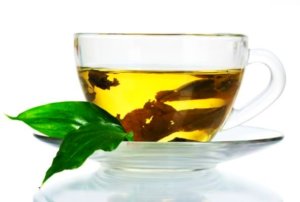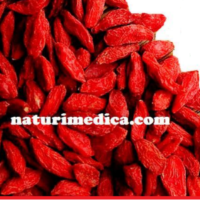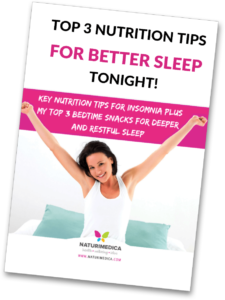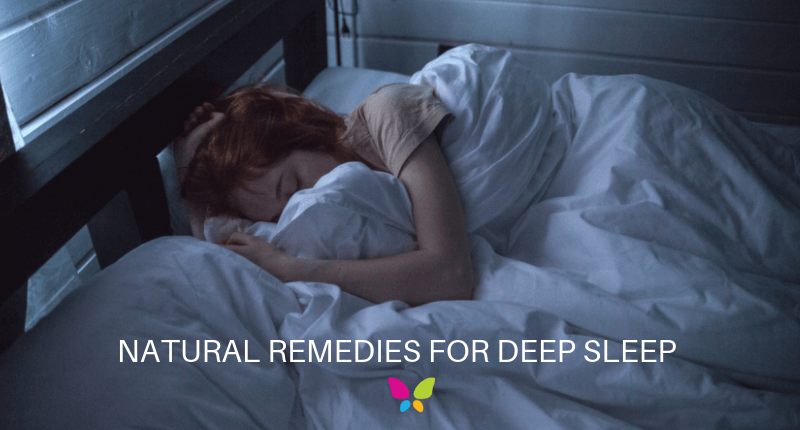Importance of sleeping better
Let’s talk about sleep! You do it every night but most likely not enough to feel energetic, healthy and well. It’s too easy to put sleep at the bottom of your priorities as our culture encourages and even glorifies skipping sleep.
(At the bottom of this article you can download my FREE Top 3 Nutrition Tips For Better Sleep Tonight )
Lately sleep has finally been getting well deserved attention from the mainstream media, with many articles on the key importance of restful sleep for our energy levels, alertness, concentration and memory, digestion and pretty much everything else to do with health and wellness!
In this article I’ll present you with my top 10 foods and home remedies for deep sleep, based on the scientific research and clinical evidence. These are key food-based remedies I recommend to my clients.
Our fast-paced world
We live in a 24/7 world where night and day merge into one long stretch of work, shopping, watching TV, constantly checking social media and smart phones, and then family time, too.
I find it hard to believe that sleep is seen by some as non-productive time and as something that gets in the way of doing and having more. Some even say that sleeping for 7-8 hours is for undisciplined and lazy people (!), and not for top achievers or successful executives (not true at all!).
Therefore, it’s not surprising that many people don’t realise how important sleep is to their overall health, wellbeing and functioning well daily. They burn the candle at both ends – stay up late at night and then get up early to go to work, creating sleep deficit as they go.
In the meantime, the lack of sleep starts to affect their work performance and productivity, their moods and stress tolerance, and most significantly short- and long-term health.
We now know that sleep and lack of it affect many body systems including brain function, metabolism (and weight gain), the immune system, the hormones and endocrine system.
There is no doubt that insufficient sleep will derail your efforts to improve your health and lifestyle habits.
Some examples:
- You won’t exercise if you’re exhausted from lack of sleep
- You won’t make good food choices if your appetite is out of whack and you eat sugary foods to quickly get more energy to keep going
- And you won’t be able to control stress either, likely depleting your adrenal glands in the process, leading to adrenal fatigue or chronic fatigue down the track
Importantly, you don’t have to lose huge amounts of sleep before it takes its toll.
Partial sleep deprivation has substantial effects on sleepiness during the day, on reaction times and motor and cognitive functions. Brain fog sets in, it’s hard to concentrate on even basic tasks, and an uneasy feeling of overwhelm is experienced daily.
I think you get the picture and many of you are nodding your heads in recognition by now.
Home sleep remedies
The good news is these sleep problems can be dealt with effectively and quickly using natural remedies, nutrition, sleep patterns reset methods and lifestyle modifications. Many remedies for better and deep sleep are easily available, including foods that you most likely already have in the kitchen!
In my clinical and personal experience, specific foods are the most potent and simplest home remedies of all that’ll give quick and significant relief of sleep problems, if not complete resolution of them in many cases.
You’ll just need to find the foods and/or combinations that work for you!
Working with a nutritionist will definitely help to sort out your sleep problems and identify the causes (the most important step to solve sleep problems for good), but you can start experimenting yourself with specific foods to gauge which ones could work for you.
Start with choosing just ONE remedy from deep sleep remedies listed below (one at the time to see how well it works for you) and apply it for 1-3 weeks before trying another one, if needed.
Caution: If you have chronic health problems and/or are taking multiple drugs, I highly recommend you consult your health practitioner/doctor before taking homemade remedies. You’ll need to check for any medical problems such as angina, chronic pain, congestive heart failure, lung disorders as well as other prescribed and natural medicines, which may be contributing to your insomnia and broken sleep.
Moreover, I don’t recommend self-prescribing herbs for promoting sleep, especially when you’re taking prescription drugs or other over-the-counter supplements.
Herbs are complex and powerful medicines that need to be prescribed by an experienced herbalist, after carefully reviewing your case history and supplements and/or drugs you’re taking at present.
My top 10 home remedies for deep sleep
1) Golden milk (turmeric drink)
It’s an anti-inflammatory, cleansing and calming bedtime drink. Golden milk with its velvety texture (thanks to the coconut oil in it), is soothing and calming when taken at night an hour or so before sleep. It’s an effective deep and restful sleep remedy that is relaxing and soothing for any muscle or joint pain. Find great golden milk recipes here.
2) Warm milk (minimally processed, organic, full-cream milk only, if tolerant)
This is a traditional home remedy for deep sleep used for centuries. Thanks to modern research we now know this works because warm milk contains tryptophan, an amino acid that increases the amount of serotonin in the brain inducing relaxation and sleepiness.
- Warm milk with a pinch of nutmeg and a bit of raw honey works even better for deep sleep.
- Goat’s milk for deep sleep – a client of mine recommended this to me as her go-to fix for severe insomnia. Have 1 glass of warm goat’s milk 30 minutes before dinner, and another glass 30-40 min before bedtime.
- Almond milk – it’s dairy free and high in calcium, a calming mineral that induces sleep by supporting melatonin production (a hormone produced by the pineal gland in the brain) and thus promoting sleep.
- I found more good milk recipes HERE.
- Don’t consume cow’s milk if you have known intolerances or sensitivities to lactose or caseine.
3) Herbal teas
These are the safest and gentlest forms of herbs to take at home. All teas are best taken before bed and/or during the day as well, where indicated:
- Chamomile tea – an old favourite and safe remedy to help with stress release, lower anxiety, settle down the stomach and induce sleep.
- Lemon balm – tastes great and is a treat anytime. It’s best enjoyed after dinner (it also helps digestion) or around 30 minutes before sleep to relax. Adding a small amount of raw honey will enhance the relaxing effect. Read more about benefits of lemon balm here.
- Passionflower – traditional use of this herb for insomnia, anxiety and nervousness is now confirmed by studies. Combining passionflower, lemon balm and chamomile will produce even better results for insomnia and interrupted sleep.
- Thyme tea before bed is said to help with nightmares. Use dried or fresh thyme, add a bit of Manuka honey for a more powerful effect. Find out more about medicinal properties of thyme here.
- Lettuce tea – not commonly used but it’s effective for restful sleep by being calming and relaxing drink. Simmer a head of lettuce in 2 cups of boiling water for 15 min. Strain and drink 30 min before bed with a bit of honey. I had good reports from clients who persisted with this less known remedy.
4) Kiwi fruit
We know that it’s rich in vitamin C, fibre and minerals, and now a number of studies revealed that kiwi fruit is also high in antioxidants and serotonin that may be beneficial in the treatment of the sleep disorders. According to these studies eating kiwi fruit improves all aspects of sleep – onset, duration and quality.
Good fibre intake promotes more of deep or slow wave sleep. To reap kiwi’s sleep benefits, have 2 kiwi fruits with a few nuts (such as almonds, walnuts, macadamia, etc.) one hour before bed. Do this for at least 2-3 weeks 4-5 nights per week to see if this works for you. Discover more fantastic health benefits of kiwi fruit in my post.
 5) Goji berries
5) Goji berries
They are high in natural melatonin and thus have a positive effect on deep sleep, they lessen fatigue and make us feel good. The bright red berries are not only tasty but also have many important nutrients such as vitamins A, B, C and E; antioxidants and trace minerals including lithium that is beneficial for mental health and more balanced moods.
Eaten on a regular basis, goji berries increase the feeling of being calmer, happier and more content with life. To gain the benefits, have a handful of good quality goji berries (organic are best) during the day or as a snack before sleep, combined with a few raw soaked almonds (which contain melatonin) and pumpkin seeds (which contain tryptophan – a calming and sleep-promoting amino acid). Read more about goji berries benefits. Read more about goji berries here.
6) Bananas
Bananas contain tryptophan, an amino acid that induces sleep and relaxation; minerals potassium, magnesium (which is calming and relaxing) and beneficial carbohydrates – an ideal combination for a bedtime snack. Here’s a before sleep snack example: half a banana cut into two pieces with a nut butter spread over them. Eat slowly and chew well to gain most benefits!
Banana tea recipe by Dr Michael Breus, a sleep specialist:
Take 1 organic banana and cut off the tips. Cut the banana in half (leave the peel on) and boil it in 2-3 cups of water for 5 minutes. Leave the liquid to cool down for 5-10 minutes, strain and drink the water 30 minutes before bed.
7) Elderberry juice
Traditionally known to induce sleep, it also has other valuable benefits such as antioxidant properties and it’s also strongly antiviral – learn more about benefits of elderberry here. For best results have 1 glass of diluted elderberry juice (around 40% pure elderberry juice from health food shops & 60% warm water) 60 minutes before sleep. Continue for a few weeks to gauge its effect on your sleep.
8) Foods containing natural melatonin
Melatonin is a hormone secreted by the pineal gland in the brain at night to help regulate our circadian rhythms, i.e., our daily light/dark cycles. Its production usually drops as we age, and this may contribute to the higher insomnia rates among the elderly.
Melatonin can be taken as a supplement; however, it’s only available by prescription in some countries, including Australia. Please note that testing is required to determine the right dose for each person to make it as effective as possible, without taking too much. It’s much safer to obtain melatonin from some common foods, although the amount of melatonin present is relatively small.
Foods highest in melatonin include:
- Goji berries (as discussed above)

- Raspberries
- Nuts – walnuts, almonds
- Sour (tart) cherries (fresh or juice)
- Flaxseeds
- Grains – rice and oats
- Vegetables – broccoli and tomatoes (cooked)
9) L-theanine
It’s an amino acid found in green tea leaves that was found to help alleviate anxiety that interferes with sleep. Taking L-theanine during the day may actually help you be more relaxed at bedtime, and taking some before bedtime may also help you to relax and reduces anxiety so that you find it easier to get to sleep and stay asleep. It also supports cognitive function and memory. Find more information about L-theanine and its benefits for sleep here.
10) Honey
Raw honey (taken if safe and tolerated) contains the sleep-inducing amino acid tryptophan as well as minerals, vitamins and enzymes highly beneficial for good health. To promote deeper sleep, I recommend mixing a teaspoon or two of raw, unprocessed honey into a cup of warm chamomile tea or warm water and drinking it 30 minutes or so before bed.
It’s important not to mix the honey in hot water as some of the beneficial ingredients are sensitive to heat and are destroyed by it.
Significantly, when taken before bed, the honey provides sufficient glycogen storage in the liver for the night reducing the likelihood of waking up during the night.
FREE DOWNLOAD – Sleep Guide
 Having seen many fantastic outcomes of restored and now good sleep in my practice, I created a short, free ‘better sleep’ guide for my clients that I’d like to share with you.
Having seen many fantastic outcomes of restored and now good sleep in my practice, I created a short, free ‘better sleep’ guide for my clients that I’d like to share with you.
It comprises basic key nutrition tips based on my clinical experience and research, to give you the most important, common sense steps and actions you can do right now to get sounder and more restful sleep tonight.
This FREE Sleep Guide (downloadable as a PDF) will provide you with key tips and guidance to significantly improve your sleep fast, especially if you’re struggling with fatigue, adrenal fatigue, anxiety or hypoglycemia.
Download your copy of the Top 3 Nutrition Tips For Better Sleep Tonight! Key nutrition tips for insomnia plus my top 3 bedtime snacks for deeper and restful sleep
Joanna Sochan
Wholistic Health and Lifestyle Therapist
Natural and Lifestyle Therapies for Abundant Health and Wellbeing
Additional resources
- Top nutrition tips for insomnia and interrupted sleep
- Holy basil: a key herb for stress, anxiety, depression and fatigue
- Weight loss: 3 reasons why you are not losing weight
- Nutrition for good mental health: the evidence
- Low blood pressure: how to raise it naturally
- Top bedtime and late night snacks ideas and recipes
Disclaimer: The above material is for informational and/or educational purposes only. It should not be used to self-diagnose and it is not a substitute for a medical advice, diagnosis, treatment, prescription or recommendation. All viewers of this content, especially those taking prescription or over-the-counter medications, should not make any changes in their health regimen or diet before first consulting a doctor or other qualified health provider with any questions they may have regarding a medical condition or their particular circumstances.
 Joanna Sochan is a Natural Therapist and founder of Naturimedica Wholistic Wellcare. She has a passion for helping clients transform their lives by becoming healthy and well naturally. Joanna has 12+ years experience in clinical practice and has special interest in solving complex cases, gut health, food sensitivities, hormone imbalances, autoimmune disorders and weight loss. She helps clients individually (mostly online) Australia-wide and also offers online therapeutic programs, eCourses and self-help eBooks. View full bio.
Joanna Sochan is a Natural Therapist and founder of Naturimedica Wholistic Wellcare. She has a passion for helping clients transform their lives by becoming healthy and well naturally. Joanna has 12+ years experience in clinical practice and has special interest in solving complex cases, gut health, food sensitivities, hormone imbalances, autoimmune disorders and weight loss. She helps clients individually (mostly online) Australia-wide and also offers online therapeutic programs, eCourses and self-help eBooks. View full bio.
 Print This Post
Print This Post 

Leave A Comment